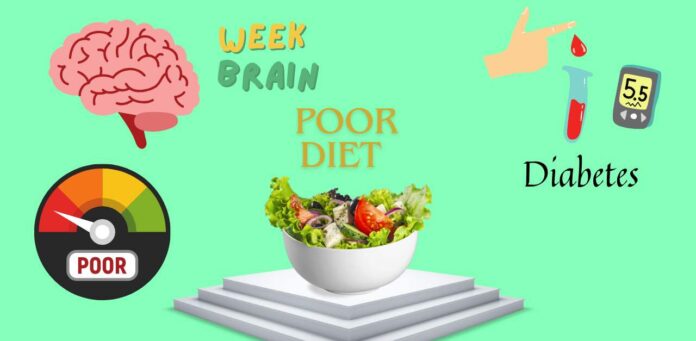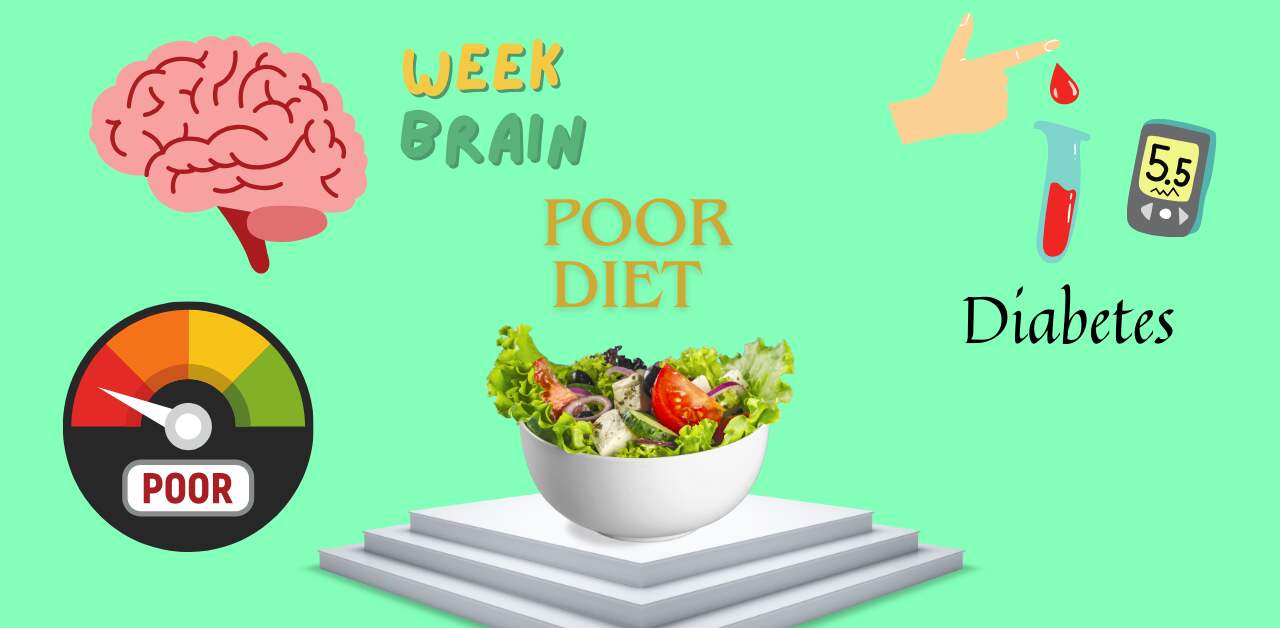Connection between Weak Brain Health, Poor Diet, and Diabetes In the fast-paced world we inhabit, maintaining optimal health is a challenge many face. An important factor that is frequently ignored is the challenging relationship that exists between the growth of diabetes, eating habits, and the condition of our brain. In this post, we will discuss the strong link between a poor diet and a weak brain, as well as how these factors may contribute to the development of diabetes.
The interlinking between the brain, diet, and diabetes:
- Our brains are the control centers of our bodies, regulating various functions, including metabolism. Insufficient nutrition can lead to brain decline, which can initiate the onset of diabetes. A connection between particular food choices and metabolic and cognitive processes is what accounts for the correlation.
Understanding the Impact of a Poor Diet on Brain Health:
- Saturated fats can be dangerous to the health of your brain. Some foods are known to affect brain functions like memory, concentration, and all-around mental clarity. The aging brain’s ability to regulate vital physiological functions, like insulin sensitivity, decreases with age, boosting a person’s risk of developing diabetes.
The Role of Nutrient-Rich Foods in Strengthening Brain Function:
- At the same time, a diet that contains nutrients may reduce the risk of diabetes while enhancing brain health. Antioxidants, omega-3 fatty acids, and vital vitamins and minerals that can be found in fruits, vegetables, and whole grain foods have a major impact on the regular improvement of brain function. This article examines the close connection between a poor diet and brain damage, as well as the possible role that these factors play in the onset of diabetes.
The Relationship between Insulin Sensitivity and Brain Health:
- Insulin is a hormone secreted by the pancreas (pancreatic β-cell), which is essential for controlling blood sugar levels. A weakened brain, often a consequence of poor dietary choices, can disrupt the intricate balance of insulin in the body. Insulin resistance, a condition that precedes diabetes, is consequently more likely as a result of this imbalance. Optimal brain health is, therefore, integral to maintaining proper insulin function and preventing the onset of diabetes.
Important steps for controlling diabetes and improvements.
- Adopt a Balanced Diet: Prioritize whole, nutrient-dense foods while minimizing the intake of processed and sugary items.
- Regular Physical Activity: Engage in regular exercise to support both brain health and insulin sensitivity.
- Stay Hydrated: Proper hydration is crucial for overall health, including brain function.
- Manage Stress: Chronic stress can negatively impact both the brain and metabolic processes, so incorporating stress-reduction techniques is essential.
These are some questions and answers on the subject:Diabetes is Caused by a Poor Diet and a Weak Brain.
How does a poor diet affect brain health?
A poor diet, often high in processed foods and sugars, can lead to inflammation and oxidative stress in the brain. These factors contribute to cognitive decline and weaken the overall function of the brain.
What specific nutrients are crucial for brain health?
Nutrients such as omega-3 fatty acids, antioxidants, vitamins (especially B vitamins), and minerals like magnesium and zinc play a vital role in supporting optimal brain function.
How does a weakened brain increase the risk of diabetes?
A weakened brain can disrupt the regulation of insulin, a hormone crucial for controlling blood sugar levels. This disruption can lead to insulin resistance, making individuals more susceptible to developing diabetes.
Can improving brain health help prevent diabetes?
Yes, adopting a lifestyle that supports brain health, including a balanced diet and regular exercise, can enhance insulin sensitivity and reduce the risk of diabetes.
Are there specific foods that can help prevent diabetes?
Foods rich in fiber, whole grains, fruits, and vegetables are beneficial for maintaining stable blood sugar levels and reducing the risk of diabetes. Additionally, foods with anti-inflammatory properties can contribute to overall health.
How does exercise contribute to both brain health and diabetes prevention?
Regular physical activity enhances blood flow to the brain, promotes the release of neurotransmitters, and improves insulin sensitivity.
Conclusion:
In conclusion, the link between a weak brain, a poor diet, and the development of diabetes underscores the importance of conscious lifestyle choices. By prioritizing a nutrient-rich diet, engaging in regular exercise, and adopting stress-management practices, individuals can fortify their brain health and reduce the risk of diabetes. Taking proactive steps towards a healthier lifestyle is not only beneficial for the mind but also for overall well-being.






Selah Long
[…] it with lifestyle changes can enhance its benefits. Regular exercise, a balanced diet, and stress-reduction techniques contribute to overall […]
[…] factors, such as illness, the use of antibiotics, a poor diet, or stress, can disrupt the delicate balance of gut bacteria. Probiotics help restore this balance, promoting […]
[…] connection between mental and physical health is often referred to as the mind-body connection. This concept emphasizes the interrelationship […]